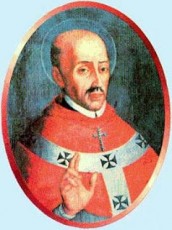Catholic Blesseds, Saints, Solemnities & Holy Days

Saint Turibius of Mongrovejo
Feast Day: March 23
Patronage: Native Rights, Latin American Bishops, Peru
St. Turibius was born in Mayorga de Campos, Spain. He was born of a noble family and was highly educated. His parents named him after the Spanish saint Turibius of Astorga. He became the Professor of law at the highly reputed University of Salamanca. King Philip II appointed him as Grand Inquisitor of Spain on the Court of the Inquisition at Granada due to his learning and virtuous reputation. It was during this time that he was ordained a Priest in 1578, and was sent to Peru. He was named Archbishop of Lima, Peru, in May of 1579.Â
He arrived at Paita, Peru – some 600 miles from Lima on May 24, 151. He began his mission work by traveling to Lima on foot, baptizing and teaching the natives. He was famous for saying, “Time is not our own, and we must give a strict account of itâ€. He traveled the 170,000 square miles of his Diocese three times, generally on foot, defenseless and alone. He was exposed to tempests, torrents, deserts, wild beasts, tropical heat, fevers and sometimes threats from hostile tribes. He ended up baptizing and confirming nearly one half million souls, among them was St. Rose of Lima and St. Martin de Porres. Â
He built schoolhouses, chapels, hospitals, roads, convents, and in Lima, in 1591, he founded the fist seminary in the western hemisphere. He assembled thirteen diocesan synods and three provincial councils. He was seen as a champion of the rights of the natives against the Spanish Masters. He learned the local dialects so he could communicate with them, to convert and baptize. Â
Years before he died, he predicted the day and hour of his death. At Pacasmayo, he contracted fever, but continued laboring to the end, arriving at Sana, near death. He dragged himself across the sanctuary and received the Viaticum, expiring shortly after, on March 23, 1606. Pope Innocent XI beatified him in 1679, and in 1726 Pope Benedict XIII canonized him. Â
Practical Take AwayÂ
St. Turibius was born in Mayorga de Campos, Spain. He was born of a noble family and was highly educated. He became the Professor of law at the highly reputed University of Salamanca. King Philip II appointed him as Grand Inquisitor of Spain on the Court of the Inquisition at Granada due to his learning and virtuous reputation. It was during this time that he was ordained a Priest in 1578, and was sent to Peru. He was named Archbishop of Lima, Peru, in May of 1579. He traveled his dioceses many times, preaching and teaching to the natives, converting and baptizing them. Â





